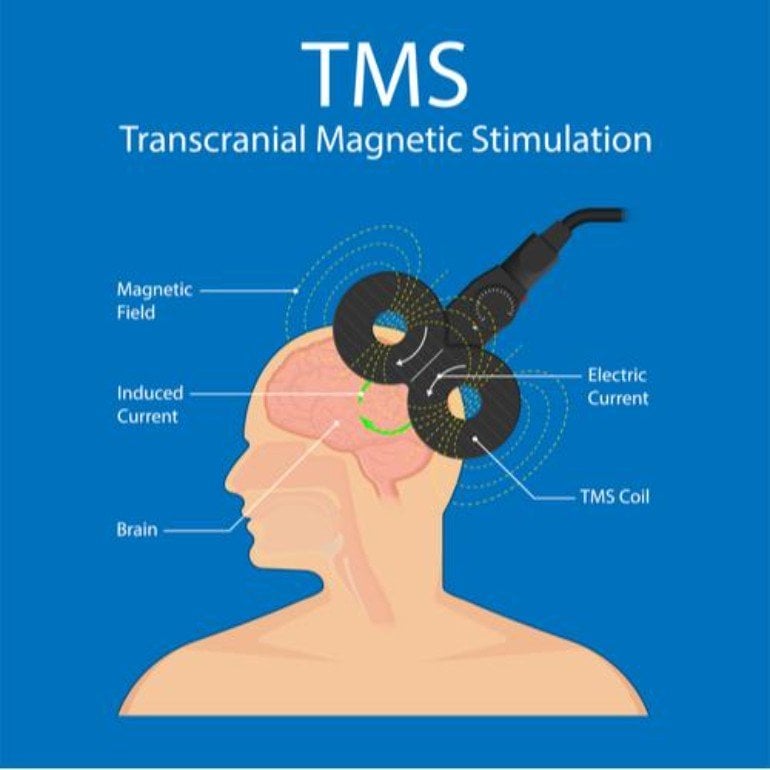Summary: Repetitive transcranial magnetic stimulation significantly decreases post-stroke depression by increasing brain activity.
Source: University of South Australia
University of South Australia researchers have made a major breakthrough in the treatment of depression after stroke, using a high frequency brain stimulation device to improve low moods.
A trial led by UniSA stroke researcher Dr Brenton Hordacre has found that large doses of repetitive transcranial magnetic stimulation (rTMS) significantly improve post-stroke depression by increasing brain activity.
Previous studies have experimented with the use of rTMS but this is the first time that a large treatment dose – 30,000 electromagnetic pulses delivered over two weeks – have been trialled, showing positive changes in brain function.
The findings, published in the Journal of Neurology, could signal a non-invasive, alternative treatment for post-stroke depression in place of medication, which can have negative side effects for many people.
South Australians are set to benefit from this research with the brain stimulation device now available at UniSA’s City West campus to treat stroke patients suffering depression.
The $40,000 brain stimulator, partly funded by the Honda Foundation, could also potentially improve motor recovery, helping stroke patients develop new connections in the damaged brain.
“The advantage of using TMS to treat depression is that it has relatively few side effects compared to pharmacological treatments,” Dr Hordacre says. “It can also be delivered over several sessions but the improvements in depression last well beyond that period.”
An estimated 500,000 people in Australia are living with the effects of a stroke, and this figure jumps by 56,000 each year as a result of people suffering either an ischaemic (clot) stroke or a cerebral haemorrhage (bleed).
One in three people experience depression within five years of their stroke, mostly in the first year, although it can occur at any time.
“A stroke is a life-changing event in itself, bringing about personality, mood and emotional changes, so there is a very strong link between stroke, depression and anxiety,” Dr Hordacre says.
Antidepressants and psychotherapy are commonly used to treat depression post-stroke, but rTMS gives patients another option in the wake of these findings.
Adelaide resident Saran Chamberlain was one of 11 chronic stroke survivors who took part in Dr Hordacre’s trial, receiving 10 sessions of high frequency rTMS for depression.

Saran suffered a stroke in 2013 at the age of 38. She was not a typical candidate (non-smoker, healthy and young) but a stressful job and long work hours are believed to be the main factors in her case.
She was initially left completely paralysed on the left side, and was prescribed medication to deal with the ensuing depression.
“When I heard about this trial using repetitive brain stimulation I was keen to try it to see if it made any difference,” Saran said. “It did, and the effects lasted several months. I am still on antidepressants but I have reduced the dosage quite markedly. This really has made a difference to my life!”
Dr Hordacre says the benefits of UniSA’s brain stimulation device will extend beyond the community, with the university’s allied health students trained to deliver the treatment under supervision.
The treatment will be officially launched in the new year.
About this stroke and depression research news
Source: University of South Australia
Contact: Candy Gibson – University of South Australia
Image: The image is credited to UniSA
Original Research: Closed access.
“Repetitive transcranial magnetic stimulation for post-stroke depression: a randomised trial with neurophysiological insight” by Brenton Hordacre, Kristina Comacchio, Lindy Williams & Susan Hillier. Journal of Neurology
Abstract
Repetitive transcranial magnetic stimulation for post-stroke depression: a randomised trial with neurophysiological insight
Objective
Despite high incidence of depression after stroke, few trials have investigated the therapeutic efficacy of repetitive transcranial magnetic stimulation (rTMS). Here, we aimed to evaluate clinical benefit of delivering a higher dose of rTMS compared to previous stroke trials. Secondary aims were to document adverse effects and investigate the role of functional connectivity as a potential mechanism of clinical response to rTMS treatment.
Methods
Eleven chronic stroke survivors were recruited to a double-blind, Sham-controlled, randomised trial to investigate 10 sessions of high-frequency rTMS for depression. Clinical assessments were obtained at baseline, after treatment and a 1-month follow-up. Adverse events were documented at completion of the treatment. Resting electroencephalography recordings were performed at baseline and after treatment to estimate functional connectivity.
Results
There were no differences in baseline characteristics between groups (all p ≥ 0.42). Beck Depression Inventory scores decreased for the Active rTMS group from baseline to 1-month follow-up (p = 0.04), but did not change for the Sham group at post-treatment or follow-up (p ≥ 0.17). Stronger theta frequency functional connectivity between the left frontal cortex and right parietal cortex was associated with lower baseline depression (r = − 0.71, p = 0.05). This network strength increased following Active rTMS, with change in connectivity associated with improvement in BDI scores (r = 0.98, p = 0.001). Adverse events were transient and minor and were not statistically different between groups (p ≥ 0.21).
Conclusions
Active rTMS significantly improved depression and was well tolerated. The mechanistic role of theta frequency functional connectivity appears worthy of further investigation.
The trial was registered on the Australian and New Zealand Clinical Trials Registry (ACTRN12619001303134) on September 23, 2019.






